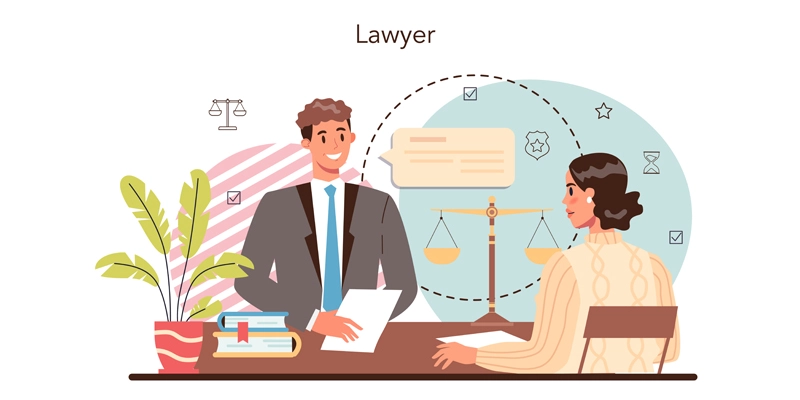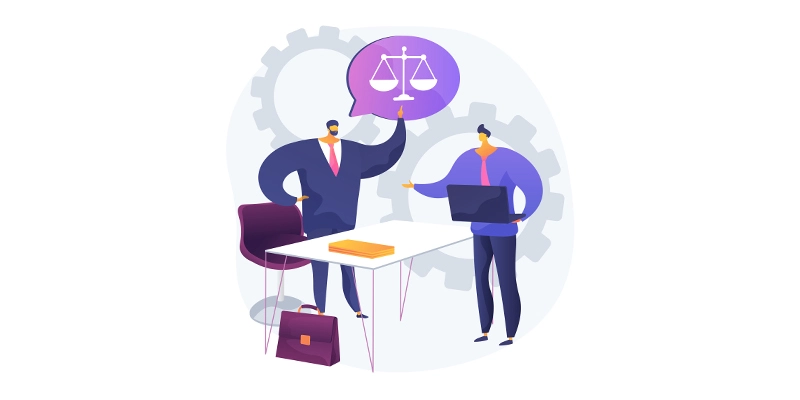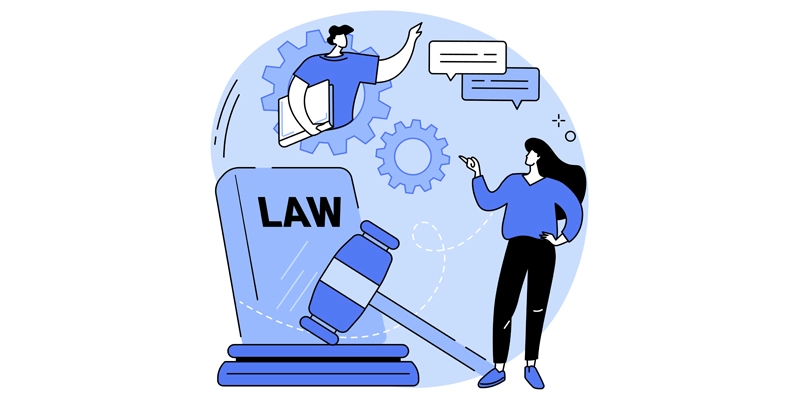Contents
Successful communication is at the foundation of all aspects of practice, from client communication to courtroom performance. Here’s a checklist of some communication skills for lawyers, explaining why they’re essential and what you can do to master them.
Communication makes law practice effective — the bedrock of client representation, trial-room persuasion, and client-firm bonds. If you are a practicing attorney, it is beneficial to understand written, verbal, and non-verbal communication modalities, not just to practice but also to keep up with today’s ever-changing law practice environment.
Law firms today need to be more than just lawyers with technical expertise to be different and deliver better client results. Good communication skills also help lawyers present complex legal theories clearly, earn clients’ trust, successfully negotiate with the other attorney, and argue their case in court. As studies show, more than three-quarters of all legal malpractice claims arise from communication problems; it is essential to have a solid communication plan in place.
This guide takes a step-by-step look at all aspects of legal communication, from how to write effective legal papers and give persuasive oral arguments to using body language and active listening. It will also examine proven methods for improving client consultations, handling challenging conversations, and modifying communication for multiple audiences and situations.
Whether you are an attorney in training or an established lawyer, knowing and using proper communication practices can help you succeed. The book offers techniques, real-life examples, and takeaway tips for lawyers to improve their communication skills at every level of training and deliver higher client satisfaction, better cases, and stronger relationships.
Understanding the Importance of Communication in Law
Communicating is part of a lawyer’s job. Legal professionals have to explain abstract ideas to clients, judges, and juries. Good communication keeps legal arguments in line, client demands in check, and business connections intact.
The Role of Effective Communication in Legal Success
A lawyer’s career often depends on his/her power of clear and compelling language. Whether settling cases, drafting court documents, or arguing in court, the better-communicated lawyers are, the better off their clients will be.
Consequences of Poor Communication in Legal Practice
Unnecessary miscommunication can result in miscommunications, client relations issues, and even expensive legal mistakes. A breakdown in communication can lead to late dates, incomplete papers, or misreading of legal counsel.
The Evolution of Communication Skills in the Legal Field
As the law changes, so does the language of the professionals working there. Today’s lawyers must be digitally fluent and capable of learning the new ways of being surrounded online, verbally, and on paper.
Verbal Communication Skills for Lawyers
You have to be able to communicate with clients in meetings, negotiations, and trials. Lawyers have to say what they mean in terms that are clear and accessible but also precise. It’s about what and how it’s said: timbre, flow, poise.
Clarity and Precision in Legal Language
Law has to be unambiguous and specific. Avoid jargon when describing the legal process to clients, and make sure all parties understand the case. Decipherment reduces the chance of misunderstanding.
Public Speaking and Presentation Techniques
Courtroom lawyers must be good at public speaking. You’ll need practice, and you have to know how to present your ideas effectively, using visuals and organized arguments. Good public speakers can seduce an audience and say something powerful.
Active Listening and Responding
The key is listening as well as articulation in the legal profession. Lawyers have to listen to clients, other lawyers, and opposing parties to fully understand their positions and react accordingly. That means not only hearing what’s being said but also examining non-linguistic utterances.
Written Communication Skills
Writing is the lifeblood of law practice. Lawyers write letters, paperwork, and documents for cases all the time. Understanding how to write clearly and persuasively is a virtue for any attorney.
If lawyers wish to be better writers, they can practice the following:
- Clarity and Clarity: Don’t use vague language. – Be specific and specific so your readers know what you’re talking about.
- Order: Organization — Format your writing orderly with headings and logical paragraphs. This keeps readers engaged with your argument or story.
- Grammar and Format: Use correct grammar and legal jargon. Follow style manuals (The Bluebook for citing law, for example) to keep it professional.
Drafting Clear and Concise Legal Documents
Lawyers should be able to write short legal papers. Clear writing keeps miscommunication and contention to a minimum, whether you’re writing contracts, briefs, or motions.
As an advice for legal documents:
- Thorough Research and Knowledge: Confirm that you are conversant with the laws and case law to ensure that your documents are legal.
- Plain English: Use simple language unless the case of laws requires you to use specialized terms. This makes it easier for legal and non-legal readers to read.
- EDIT AND REVISE: Make sure you edit your drafts so they are clear and free of redundant sentences. Request feedback to clarify.
Effective Legal Correspondence
Legal letters are all professionally written documents, such as emails and letters. Effective correspondence ensures that what you say is received and comes across professionally.
Tips for Legal Letter Writing:
- Adapt Your Language: Adjust the language and formality according to who is receiving it—the client, coworker, or judge.
- Speed and Efficiency: Responding promptly shows professionalism and hard work, valuable qualities in the law office.
- Copy-paste: Mistakes will be the death of your reputation. Always proofread before sending correspondence.
The Role of Tone and Style in Legal Writing
Tone and style do not matter how your content is received. Tone can increase the persuasiveness of your text and argument.
Tone and style in legal writing:
- Flexible: Vary your voice depending on the situation. Formal communication is acceptable for court documents, and slightly informal communication might be okay in communications with the client.
- Courtesy in a Professional Style: Be respectful and polite, especially when rejecting an argument or criticizing something.
- Be consistent: Keep the tone consistent throughout your document so you can speak in a single business voice.
Non-verbal Communication in Legal Practice
Eavesdropping language—body language, expressions, and gestures—is extremely important in the courts. Getting good at using nonverbal communication can improve your reputation and productivity.
How to get better at non-verbal communication:
- Be aware: Pay attention to your body language in other situations, such as a meeting or a court case, to ensure it is consistent with what you say.
- Active Listening: Respond to the speaker with eye contact and nods that indicate that you are listening.
- Positioning: Be confident in your body posture and movements. To be erect and gesticulate intently.
Understanding Body Language in the Courtroom
Body language can make all the difference between perception and conviction in a courtroom. For attorneys, this will involve non-verbal communication.
The following body language tactics work for the court:
- Eye Contact: Look the judges and jurors in the eye to build rapport and be sincere.
- Gestures That Can Be Managed: Hand gestures can drive attention, but they need to be managed so that they don’t distract.
- Resilience: Stay calm and collected during pressure, signaling professionalism and control.
Enhancing Client Relationships through Non-Verbal Cues
Trust and communication are foundational to good client relations, which can be developed through verbal communication.
- Strategies for how to communicate better with your clients by using the olfactory realm:
- Empathy: Embrace clients with a smile and listen as you make them feel seen and cared for.
- Friendliness: Stand in an open frame, with arms not crossed, so you are personable.
- Positive Reinforcement: Nod and smile to validate client input in meetings.
Building Rapport with Colleagues and Judges
To have a good, successful practice, you have to get along with colleagues and judges. Such relationships require communication.
Advice for building rapport includes:
- Respectful Communication: Talk respectfully and honestly with each other, listen to and respect each other’s ideas and perspectives.
- Consistency and Integrity: Be consistent and keep your actions and words straight and narrow.
- Networking: Use opportunities to network and establish connections outside formal events (professional events).
Persuasion and Negotiation Skills
Persuasion is a fine art that can significantly affect courtrooms. Lawyers must use methods like creating logic and emotion, knowing who they are talking to, and storytelling to communicate their message. Being good at questioning presumptions and actively engaging in the discussion of counterarguments also increases the power of the attorney.
Crafting Persuasive Arguments
It’s an excellent legal argument about being transparent and logical. Advocates should look for an argument structure that benefits from arguments and precedent. The trick is to be aware of objections and deal with them in the argument. Creating a story consistent with the client’s objective and within legal limits helps with persuasion, too.
Strategies for Effective Negotiation
We must be good negotiators to achieve results. Law firms must prepare carefully based on all parties’ interests and options. To be more effective in negotiations, use techniques like problem-solving together and getting win-win results. Flexibility and transparency allow you to pivot as the negotiation goes on.
Balancing Assertiveness and Empathy
Law firm lawyers can sometimes be a cross between aggressive lobbyists and soft-spoken listeners. Empathy is essential in getting a client’s attention and building a relationship, and assertiveness is vital in propelling litigation and negotiation. Good lawyers can switch back and forth between them, flexing muscle and wisdom as necessary.
Communication with Clients
Trust and confidence are built by forming a good communication flow with your clients. Lawyers must also be transparent, updating their clients on the status of their cases and letting them know if something goes wrong. Active listening and understanding of client issues are also essential, along with utilizing language in which legal slang can be explained in plain English so that clients become informed citizens in their own legal affairs.
Establishing Trust and Confidence
Trust with clients starts with professionalism and trust. Attorneys must work within the time limit, honor promises, and not be kept in the dark. Trust is also built through honest and frequent communication in which the client’s interests are heard and taken seriously.
Managing Client Expectations
Realism saves time and hassle from confusion and disappointment. At the first consultation, counsel needs to discuss all possible outcomes, the time frame, and anything else that is affecting the case. Communicating on a regular basis is imperative to keep up with developments and provide clients with the most current picture of where they stand in the legal system.
Delivering Bad News with Compassion
Delivering bad news is part and parcel of the law. Lawyers should be able to listen to clients directly and compassionately to support them. Explaining decisions and what’s next can help clients sort information out and trust their lawyers.
Enhancing Client Communication through Technology
With the onset of technology, there are possibilities for lawyer communication. Video conferencing, secure messaging, and online client portals help make everything more accessible and efficient. Attorneys must combine these tools to optimize the flow of communications and provide fast and convenient service to clients without violating confidentiality or ethics.
Interpersonal Communication within Legal Teams
Interpersonal communication is the foundation of any good legal team. Lawyers have to be good at making brutal legal facts come through loud and clear. Listening and taking time to listen to others’ subtle thoughts are also important so you do not have the same confusion in the future and can work well together. Meetings or video conferences help keep the team together and allow them to work through problems in real-time.
Collaboration and Team Dynamics
“Collaboration is part of successful legal work. Not only working with people on the team and using everyone’s strengths. Teamwork can be improved by having clear roles and responsibilities, allowing for honest communication, and a culture of respect. So, lawyers must work to make the differences between the team members by cultivating inclusivity and diversity that gives other viewpoints and new solutions.
Conflict Resolution and Mediation
There will be disputes in a high-pressure courtroom, but how to deal with them is where the natural leader comes into their own. Lawyers must know conflict resolution and mediation so disputes can be resolved before they escalate. That means looking at the problem early on and working through it with listening, empathy, and negotiation to work towards shared benefits. Mediation can save you time and stress and keep your career alive.
Mentoring and Coaching Junior Lawyers
Mentoring and coaching are critical aspects of legal career advancement. An Experienced lawyer can walk their younger colleagues through their careers and provide advice and feedback to help build their competence. Organized mentorship structures can also offer check-ins and plan exercises that keep you constantly improving your professional skills and ensuring an active learning environment.
Building a Culture of Continuous Improvement
Improvisation should become part of the firm’s culture. That means encouraging input, analyzing yourself, and changing with the times. Lawyers need to be open to new techniques, devices, and technologies that can boost efficiency and effectiveness. Regular training and workshops can keep teams on top of the latest industry news and best practices while building an attitude of change rather than resistance.
Utilizing Technology for Enhanced Communication
The tools available for legal communication are powerful. These digital products, from practice management software to online platforms, automate the process and enable remote working. Attorneys need to be the first ones to embrace technologies that increase efficiency and improve access and convenience for their clients and employees.
Digital Communication Tools in Legal Practice
Digital tools like email, chat, and document management systems have transformed law firms. These technologies help us be fast and share information efficiently. However, they have to be selected and deployed in a way that does not lead to information overload or secrecy. Lawyers should ensure that digital communications are as professional and clear as the old-fashioned way.
Maintaining Confidentiality and Security in Digital Communications
Keeping secrets remains an ethical principle in the law, at least in the online world. Lawyers must ensure that information transmitted electronically is adequately protected. This could mean encrypted communications, safe file sharing, and regularly refreshed cybersecurity procedures. We must also continuously educate ourselves on the new digital risks and ad-blocking tools to protect clients’ privacy and trust.
The Future of Communication Technology in Law
However, as technology develops, so will how legal communications are changed. Artificial intelligence, blockchain, and other new technologies are all opportunities and threats for lawyers. It will be important to be aware of these changes if we use the latest tools and deal with their legal and ethical aspects. The future may include still more automation of day-to-day processes, leaving lawyers free to practice strategic, finer-grained law.
Balancing Technology and Personal Interaction
Even if lawyers adopt technology, they shouldn’t deny that there’s something to be said for human connection. Trust and deep connections with teams and clients are still keeping track of the old-fashioned way. Finding a compromise between online and in-person communication can improve efficiency and compassion in the law. One-on-one interactions sometimes deliver emotional context and insight for advocacy and representation.
Mastering Communication: The Key to Legal Excellence
In law, communication skills might be the difference between success and failure. Lawyers also have to write well to persuade clients, colleagues, judges, and juries. Learning this art isn’t just about presenting information concisely; it’s also about listening to understand and address people’s needs and issues.
Communicative abilities can help the lawyer better understand the case, negotiate favorable settlements, and develop lasting relationships. These abilities make the law a great practice through trust, knowledge, and cooperation by all involved.
Want to Grow Your Law Firm?
The best communication is the key to growing a law firm’s client list and brand. Strategic communication strategies can connect lawyers with the community, making the firm more trustworthy and popular.
Communicating regularly and transparently with clients builds trust and loyalty. Lawyers must adhere to open and transparent conversations, whether in-person, written, or online. Networking and public speaking sessions can help lawyers establish themselves as industry experts and attract new clients and businesses.
Frequently Asked Questions
1. What are the critical communication skills every lawyer should master?
As lawyers, you have to be attentive to listening, clear and concise, compassionate, and flexible. Lawyers who listen attentively learn how to better respond to their client’s needs and concerns, while clear and concise writing helps lawyers make legal arguments. By being empathetic, lawyers get to know their clients and build relationships with them. Third, you must be flexible in adapting your style to different audiences and environments.
2. How can technology improve communication in legal practice?
Technology has changed legal communications, allowing for better and faster communication. Email, videoconferencing, and instant messaging all make correspondence timely, transcending boundaries and making things more accessible to customers. Moreover, law firm practice management software automates case management and document sharing so everyone gets the latest information.
3. Why is managing client expectations important in legal practice?
Client expectations must be managed to maintain professional integrity and client satisfaction. Law firms need to tell their clients exactly what is at stake, when it will occur, and what it will cost so that they are not confused and build realistic expectations. If expectations are outlined and controlled in advance, attorneys avoid unnecessary anxiety and frustration and have a better experience with the client.
4. How can I improve my negotiation skills as a lawyer?
To get better at negotiating, you have to know who is interested and why they are. Lawyers should prepare carefully, look for common ground, and work in a team. PATIENCE and SUFFICIENT COOLNESS ARE ALSO ESSENTIAL IN NATIONAL NEGOTIATIONS. Courses and workshops help lawyers practice their negotiation skills.
Disclaimer: The content provided on this blog is for informational purposes only and does not constitute legal, financial, or professional advice.









